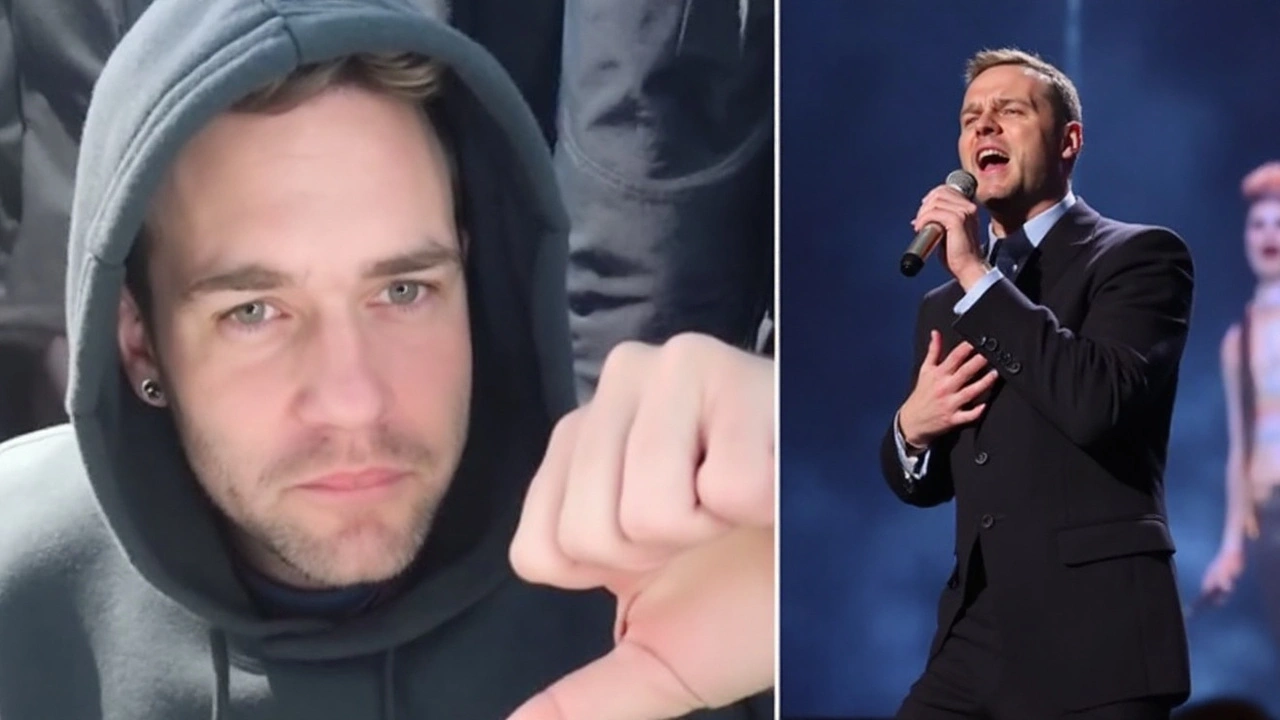A 20-minute show that wasn't meant to be
Thousands packed into Glasgow’s OVO Hydro expecting a full-throttle arena night. Instead, the lights came up just 20 minutes in. After six songs, Olly Murs told the 14,000-strong crowd, “My voice has gone,” and walked off, promising he’d be back but admitting he couldn’t finish. It was a gut-punch of a moment—no drama, no theatrics—just a singer whose instrument suddenly wouldn’t cooperate.
The incident happened on Thursday (May 22), a month into his arena run that started in Plymouth. The turning point came right after “Kiss Me Like You Mean It.” Murs stepped to the mic, leveled with the room, and left. Silence followed, then house lights—one of those rare times you could feel a collective pause and confusion in a venue built for big, loud nights.
He didn’t leave fans guessing for long. In an Instagram video shared soon after, the 40-year-old sounded drained and apologetic. “From the bottom of my heart, I am so sorry,” he said, stressing that in 15 years on the road, he’d never had to pull himself from a show mid-performance. He explained he’d gone onstage believing he could get through it—feeling “a little run down,” but not worried enough to cancel beforehand. Once the songs started, reality hit.
“Most of the time, as singers, you can get through it if your voice is not 100%,” he said in the clip. “I walked out tonight thinking my voice is great… But I didn’t think I couldn’t do the show or I wouldn’t have come out otherwise.” The decision hurt, he admitted, especially given the cost and effort fans put into a night like this—travel, hotels, time off, the whole lot. “You deserve the best show,” he said. “Me being at my best… as you can probably hear in my voice, it sounded rubbish.”
By the time the arena emptied, attention had turned to what happens next. The singer said he would see a doctor the same night to assess his voice ahead of a stacked weekend: Manchester’s AO Arena on Friday (May 23), Birmingham’s bp pulse Live on Saturday (May 24), and London’s O2 Arena on Sunday (May 25). As of late Thursday, there was no confirmed plan for Glasgow—no rescheduled date or refund information announced at the venue. Fans who were at the Hydro will be watching for guidance from the tour team and ticket providers.
The abrupt end felt especially jarring because Murs is usually unflappable onstage. Last year he navigated a different kind of setback—flight delays forced him to miss a support slot for Take That, and a local pub singer filled in—but voluntarily stepping off mid-show is a new kind of low for any performer. That matters when your brand is built on reliability, charm, and big singalongs delivered on time, every time.
What’s clear is he didn’t try to push through it for an hour and leave hoarse; he pulled the plug early. That’s a tough call in the moment—do you limp through a truncated set and risk real damage, or stop, rest, and protect the rest of the tour? He chose the second option. If you’ve ever lost your voice before a big meeting or event, you know the dread. Multiply that by 14,000 people and a national tour schedule, and you get the picture.
Fans came for a full arena set: the big radio hits, the full band, the feel-good chatter. The early six-song run teased where the night might have gone—expectations for tracks like “Dance with Me Tonight,” “Troublemaker,” “Dear Darlin’,” and “Heart Skips a Beat” were hanging in the air. Instead, the show ran out of road right as it was getting moving.

Why singers walk off: the reality of vocal health and touring
People assume touring is just two hours on stage and a selfie with the drummer. It’s not. It’s travel, early radio hits, meet-and-greets, climate changes from city to city, dry arena air, and constant speaking on top of singing. That’s the daily wear-and-tear that can push even seasoned performers into trouble. A voice isn’t a guitar you can swap out when a string breaks; it’s muscle and tissue you only get one of.
Common issues behind a night like Glasgow include acute laryngitis (often linked to a cold or fatigue), vocal fold swelling from overuse, or just the classic “tour cough” that makes high notes risky. Singers can sometimes manage with rest, hydration, steam, and warm-ups. But sometimes the safest move is to stop before minor irritation turns into a weeks-long injury. You hear artists talk about “blowing out” their voice—this is what they’re trying to avoid.
There’s also the mental side. Walking off mid-show is the last thing any performer wants to do. They’ve got pride, and they know the optics. But fans generally get it when the message is honest and fast. Murs did that—he spoke to the room in real time, then posted a video within hours, clearly struggling to talk. Owning the moment matters. It helps reset expectations and buys time while doctors take a proper look.
Procedurally, here’s what usually happens after a night like this:
- Assessment: an ENT or voice specialist checks for swelling, infection, or irritation and may put the singer on vocal rest.
- Short-term plan: strict rest, fluids, steam inhalation, and sometimes medication to reduce inflammation, with a reassessment before the next show.
- Scheduling call: the artist, management, and promoter decide whether to proceed with the next dates, scale back, or postpone.
- Ticket guidance: the promoter confirms whether the affected show will be rescheduled or refunded, and how tickets will be handled.
That fourth step is the one fans are waiting on in Glasgow. If a show is rescheduled, original tickets are usually valid. If not, refunds are normally processed through the point of purchase. None of that was locked in as the arena cleared on Thursday night, so it’s a sit-tight situation until the team confirms the plan.
Zoom out and this isn’t an isolated story. Big-name artists have paused or cut shows when their voices gave out—no one is immune, not even the stadium regulars. High-output pop singing, lots of crowd interaction, and back-to-back arenas create a perfect storm. Even talking over loud in-venue noise or meeting fans after a gig adds to the load. One compromised night can cascade into a week off if the singer tries to power through; that’s why stopping early can actually protect the tour.
For Murs, the stakes are obvious. He’s still got a heavy run ahead, with Manchester, Birmingham, and London bunched up across the weekend. If Thursday’s call spares him a longer layoff, it’s a trade-off many artists would make. That said, any decision to go on with the weekend shows will hinge on how his voice responds to medical advice and rest over the next 24–48 hours.
There’s also the fan experience to consider. People plan months around arena shows: group chats, trains, hotels, work swaps. That’s why clear, quick communication makes a difference. A straightforward update—this is what happened, this is the medical advice, this is the plan for Glasgow tickets—sets expectations and avoids a second wave of frustration.
If you’ve never thought about how fragile a singing voice is, here’s the simplest version. Your vocal folds are tiny, delicate, and they vibrate thousands of times a second when you sing. When they’re inflamed, the edges don’t meet cleanly, which makes notes sound breathy or crack. Push through that, and you risk making the swelling worse. Rest lets the tissues calm down so the sound can seal properly again. It isn’t glamorous, but it’s how singers get back onstage.
One more factor that often flies under the radar: arenas are dry. Air-conditioning and large HVAC systems pull moisture out of the room. That can be brutal on a voice, especially on a long tour where every day feels like a flight cabin. That’s why you’ll see humidifiers backstage, steam inhalers in dressing rooms, and artists drinking more warm water than seems humanly possible. It’s all part of safeguarding the thing the show depends on.
As for the Glasgow night, there was no meltdown, no mystery. Just a straight admission—“my voice has gone”—and a hope that a quick exit would help him regroup for the weekend. The apology was heartfelt. The stakes are clear. The timeline is tight. If the doctor gives the all-clear, the tour can steady. If not, better to take a short hit now than disappear for weeks later.
What should Glasgow ticketholders do right now? Keep your ticket and watch for the official update from the promoter or your ticket provider. If the show is rescheduled, that ticket is typically your golden ticket for the new date. If it can’t be rescheduled, refunds usually follow. No one wants to hear “wait,” but it’s the honest answer until the medical picture is clear.
Murs has built a career on bounce-back energy and easy connection, which is why Thursday stung. Fans don’t just buy the songs—they buy the feeling that the show will happen, and it will be fun. That’s the promise he couldn’t keep this time. He says he hopes to recover fast. If the voice plays ball, the Manchester–Birmingham–London run is still on the table. If not, expect a cautious reset and a plan to make Glasgow whole.
For now, the story is simple: a tour hit a snag, the singer owned it, and the next 48 hours will decide whether this was a one-off wobble or the start of a short pause. The OVO Hydro will host louder nights again soon. The question is whether Murs will be back there quicker than anyone expects—or whether he’ll save that voice for the shows already circled on the weekend calendar.

